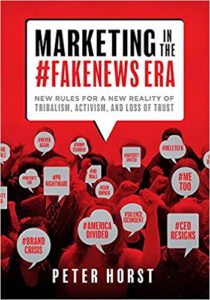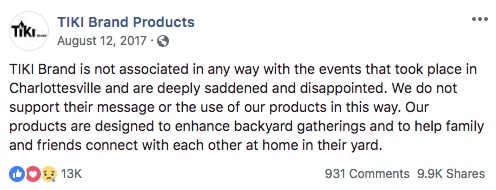The following is an excerpt from Marketing in the Age of #FakeNews: New Rules for a new Reality of Tribalism, Activism and Loss of Trust by Peter Horst (Advantage Media Group, 2018). Reprinted from Advantage Media Group and Peter Horst.
“Companies have been fence-sitters, but now CEOs are being thrown into the spotlight,” says Michael Maslansky, CEO of the reputation firm Maslansky + Partners. Businesses can no longer expect to be able to sit safely on the sidelines. Whereas it used to work well to say, “We don’t get involved in these kinds of things,” that’s become a less viable position. In a world they see as broken and with a government they don’t trust to fix it, 57 percent of consumers expect companies to be part of the solution, to step up to a leading role in making the world a better place, according to the Edelman Trust Barometer.
Neutrality is no longer such a safe and viable refuge. Who would have expected the NFL, the national obsession shared by virtually all tribes, to suddenly be at the epicenter of an emotionally divisive debate? But that’s what happened almost overnight when players began kneeling during the national anthem to protest police treatment of African Americans. Team owners were suddenly caught in the dilemma of choosing between supporting their players’ right of expression versus aligning with an angry and tweeting president— with no easy choices or risk-free solutions.
“Sports used to be a unifier, but now even sports is a divider,” according to Sarah Rabia of TBWA\Chiat\Day. “Brands have to be brave in a world gone mad. If you’re not brave, you risk being irrelevant,” she told me. The once-safe middle ground is eroding, she stressed.
“We are living in a polarized society. The Internet has given niche groups mainstream visibility, each with their own take on ‘rights.’ Bland, homogenous communications don’t work anymore. We’re more tribal and defined by our subcultures.”
When something as broadly appealing as football becomes a political hot potato, it can be tempting to hunker down on the sidelines, out of sight. But even retreating offers no safe haven. “Every position has become politicized,” Rabia said. “Even doing nothing. Silence is now considered complicity.”

No Place to Hide
The reality of the digital world is that everything is out there to be sifted, examined, and judged by increasingly activist consumers. What used to be private, local, and otherwise unnoteworthy is now liable to end up being posted online and amplified for all the world to see. There’s no cloak of invisibility in the digital age, and what happens in the cube farm, a satellite office, or even your backyard can become fodder for a very public brand crisis.
Just look at everyone’s favorite ethical whipping boy, Uber. In the midst of a litany of other controversial issues, company founder Travis Kalanick was filmed chewing out one of his drivers during a night out on the town. The video was gleefully and virally posted and commented on, only adding to the building pressure that ultimately led to his ouster as CEO.
The CEO of KB Homes, Jeffrey Mezger, is another example of a moment of bad judgment that went from seemingly private to profoundly public when he had a few choice words for his neighbor, comedian Kathy Griffin (herself no stranger to social/political turmoil). He was caught on tape going on a potty-mouthed rant against Griffin and her boyfriend after they complained about Mezger’s grandkids playing loudly in his pool. As per the new normal, the recording went viral, his bonus was slashed by 25 percent, and he was put on “double-secret probation” by his board of directors.

It’s not only CEOs who have the power to spur a public reckoning with corporate values. Deep in the cubicle farm at Google, an employee wrote a memo arguing that women aren’t suited to be good engineers (they’re more interested in people than ideas, he opined). Despite being an internal memo, the employee’s sociological musings went viral in a hurry. In the blink of an eye, Google faced a values-on-display moment and was unexpectedly put in the position of having to publicly choose between tolerating diverse opinions and enforcing its cultural tenets. In an example of successfully moving with speed and purpose, Google fired the memo’s author for violating the company’s stated values and beliefs.
It’s not only work-related incidents that can put companies on the moral hot seat. After the Charlottesville, Virginia march organized by the alt-right in August of 2017 to protest removal of statues of Confederate generals, a photo emerged in The New York Times of James Alex Fields, the man charged with the second-degree murder of thirty-two-year-old Heather Heyer. In the photograph, a fellow protester from Charleston, South Carolina stood next to Fields. A resident of Charleston recognized him and called him out on social media for championing white supremacy. The photo quickly spread, as did a link to the man’s Facebook page, which also listed his employer. Unexpectedly and overnight, the protester’s employer fell under the glare of public scrutiny. Its Facebook page was inundated with comments about the employee’s neo-Nazi ties along with negative reviews of the business. The stunned management had to scramble a response in real time, as I think I’m safe in guessing its crisis management handbook (if it even had one) did not have a section called, “What to do when an employee is photographed in a Nazi march.”

The net of all these cautionary tales is this:
- stuff happens in unpredictable ways;
- everyone will know about it;
- your fundamental values will be on trial as the world watches; and
- increasingly activist consumers will display their values by taking action on your brand.
You can’t stop it, but you can set yourself up to be preemptively inoculated and well-prepared to respond.





Join the conversation